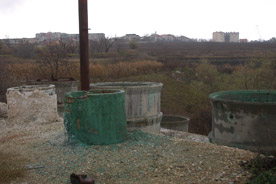Destroying dangerous pesticides in Moldova
Twenty years after independence, Moldova is still grappling with the effects of intensive agriculture production under the former Soviet Union. In the 1970s, large quantities of fertilizers, pesticides and dangerous chemicals were used on Moldovan soil to maximise crop yields. Although their use is now prohibited, large quantities of these pesticides are still stored around the country, including over 3000 tonnes in 450 poorly equipped facilities. A NATO-sponsored project is helping to address this lingering problem.

“The objective of our country is to avoid any new stockpiles of pesticides, which are dangerous for the environment and for public health,” says Anatol Spivacenco, Deputy Minister for Agriculture and the Food Industry.
Combating the effects of pollutants

Composed of over 50 per cent arable land, Moldova’s economy is heavily dependent on agriculture. Pesticides – including now-banned persistent organic pesticides – were used during the Soviet era to increase food production. Dispersed over large distances by air and water, 50 years of extensive use of pesticides and dangerous chemicals has contaminated the soil and ground water.
Although Moldova prohibited the use of these pesticides in the 1970s, the long-term effects on the population remain. Over time, the toxic chemicals can accumulate in the tissues of humans and other living organisms. As well as affecting major organs, and the reproductive and immune systems, many of the pesticides and dangerous chemicals are carcinogenic.
A three-phase NATO/Partnership Trust Fund project is addressing the threat posed by obsolete pesticides to Moldovan people. It was developed by NATO and the Moldovan Ministry of Defence in cooperation with other international organisations, including the United Nations Environment Programme, the Regional Environment Centre for Central and Eastern Europe, the United Nations Economic Commission for Europe, the United Nations Development Programme and the Organization for Security and Co-operation in Europe.
With Belgium and Romania in the lead of the Trust Fund project, Phase I was completed in July 2007 and focused on centralisation of pesticides and chemicals in 19 Regional Central Storages. An analytical lab was set up to provide a comprehensive database on pesticides and dangerous chemicals under Phase II, which was launched and finalised in early 2010, funded by the NATO Science for Peace and Security Programme.
Phase III implementation has now started. The project for the destruction of 950 tonnes of the harmful chemicals was recently contracted in February 2013, under a second Trust Fund led by Romania. The NATO Support Agency (NSPA) is responsible for overseeing implementation of the project.
Unseen dangers pose long-term risks
Cleaning up and destroying the pesticides is just the beginning for Moldova. “The problem still exists and the building material and the residuals of the pesticides keep penetrating the villages,” says Andrei Isac, Executive Director of the Regional Environmental Centre - Moldova.
Many of the facilities where the pesticides were stored have been destroyed. But even after their destruction, they present a risk. Some people have used the wood and other construction materials from the warehouses, not realising that it is contaminated with pesticides and other chemicals. “They use the materials in their households and have no idea about the dangers they pose,” points out Andrei Vacarciuc, Chairman of Cimişlia Rayon Council.
Beyond that threat, the deterioration of the warehouses and exposure to rain and wind, have allowed some of the chemicals to seep into the ground and groundwater.
In addition, some of the storage facilities, emptied of the pesticides, now store grain. “Even though the pesticides from 22 warehouses from Cimişlia have already been loaded, shipped and stored in a centralised manner, the warehouses still present a permanent danger to public health,” explains Mr Vacarciuc.
These pesticides will affect Moldova for years to come but officials hope to prevent such problems from reoccurring in the future.
